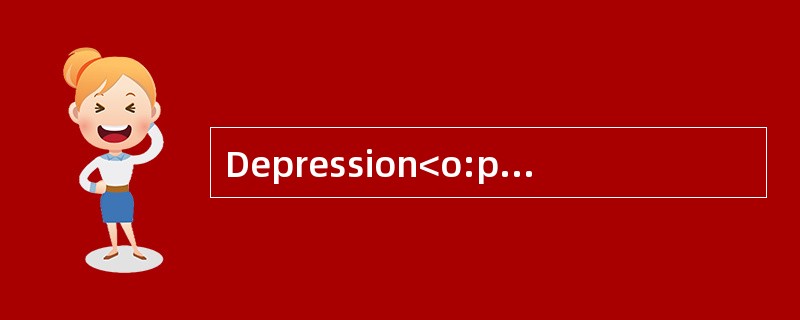Depression
Although the stigma(耻辱)once associated with mental illnesshas gradually gone away in recent years,most of the Americans who have clinicaldepression still don't get
treated for itpartly because many are too embarrassed to go to a psychologist. In fact,themajority of depressed people who seek professional help turn first not to a
psychologist but totheir primary care physician.
But do regulardoctors really know how to identify depression?A large new scientific reviewsuggests they don't. In a review of 41 previous studies,the authors found that
generalpractitioners make frequent mistakes,missing true cases of depression abouthalf the time and incorrectly diagnosing it in 19%of healthy people.
Alex Mitchell,AmolVaze and Sanjay Rao of Leicester General Hospital in the U.K. estimate thatabout 1 in 5 people in developed nations will experience depression in their
lifetime.That meansthat among a general patient population of 100,about 20 will develop thecondition,but the typical doctor will find it in only 10 of those who have it.And
among the 80 healthypeople,the doctor will incorrectly identify depression in 15.
This is significantbecause depression can make the patient and his or her family weak.Depressionalso carries an enormous social burden,leading to missed work days,loss of
productivity andincreases in health-care spending. Further,those misdiagnosed with depressionmay end up being prescribed medicine that not only costs a lot but can have
serious sideeffects.
The various studiesthat Mitchell,Vaze and Rao reviewed used different methods to verify whetherdoctors had missed depression in their patients.Virtually all the studies
pointed to the sameconclusion.general physicians aren't very good at recognizing the most commonmental illness in the world.
Why?One reason isthat the typical doctor visit is quite short,usually no longer than 15minutes.It's hard for patients to open up about their symptoms during thatbrief
period.Doctors shouldspend more time or schedule follow-up appointments with patients they suspecthave depression, which would dramatically increase the rate of
accurate diagnoses.
A.worse familyrelationship
B.refusal by thesociety
C.large medicalexpense
D.serious sideeffects
参考答案与解析:
-
相关试题
-
Depression<o:p></o:p></p><p class="MsoNormal ">Although the stigma
-
[单选题]DepressionAlthough the stigma(耻辱)once associated with mental illnesshas gra
- 查看答案
-
Depression<o:p></o:p></p><p class="MsoNormal ">Although the stigma
-
[单选题]DepressionAlthough the stigma(耻辱)once associated with mental illnesshas gra
- 查看答案
-
Depression<o:p></o:p></p><p class="MsoNormal ">Although the stigma
-
[单选题]DepressionAlthough the stigma(耻辱)once associated with mental illnesshas gra
- 查看答案
-
Depression<o:p></o:p></p><p class="MsoNormal ">Although the stigma
-
[单选题]DepressionAlthough the stigma(耻辱)once associated with mental illnesshas gra
- 查看答案
-
Depression<o:p></o:p></p><p class="MsoNormal ">Everyoneoccasionall
-
[单选题]DepressionEveryoneoccasionally feels blue or sad.But these feelings are usu
- 查看答案
-
Depression<o:p></o:p></p><p class="MsoNormal ">Everyoneoccasionall
-
[单选题]DepressionEveryoneoccasionally feels blue or sad.But these feelings are usu
- 查看答案
-
Depression<o:p></o:p></p><p class="MsoNormal ">Everyoneoccasionall
-
[单选题]DepressionEveryoneoccasionally feels blue or sad.But these feelings are usu
- 查看答案
-
Depression<o:p></o:p></p><p class="MsoNormal ">Everyoneoccasionall
-
[单选题]DepressionEveryoneoccasionally feels blue or sad.But these feelings are usu
- 查看答案
-
Depression<o:p></o:p></p><p class="MsoNormal ">Everyoneoccasionall
-
[单选题]DepressionEveryoneoccasionally feels blue or sad.But these feelings are usu
- 查看答案
-
Depression<o:p></o:p></p><p class="MsoNormal ">Everyoneoccasionall
-
[单选题]DepressionEveryoneoccasionally feels blue or sad.But these feelings are usu
- 查看答案
